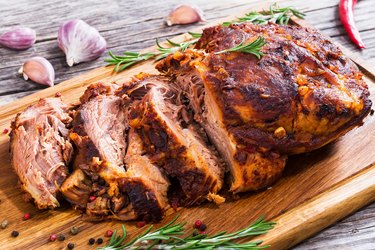
Pork shoulder cuts commonly found at a meat shop or the butcher section of your supermarket include arm picnic, arm roast, arm steak, blade Boston roast, blade steak, smoked whole picnic, smoked shoulder roll and pork hocks.
The pork shoulder arm picnic is essentially the entire shoulder. All of the other shoulder cuts come from the picnic. Pork shoulder nutrition information will vary somewhat among the cuts and, in similar cuts, will depend on whether or not the meat is cured or smoked.
Video of the Day
Video of the Day
According to research from the U.S. Department of Agriculture (USDA), current nutritional analyses for pork cuts reflect significant decreases in the fat content of meat from livestock pigs since the early 1990s.
Calories
A 100-gram portion of fresh raw pork shoulder, which is a little more than 3 ounces, contains 186 calories. Sixty percent of these calories come from fat, and the other 40 percent come from protein. (Meat does not contain carbohydrates.)
Fat and Cholesterol
Pork shoulder isn't considered a lean cut of pork, because it's somewhat high in fat and saturated fat. A 100-gram portion contains 12 grams total fat, which is 19 percent of the daily value (DV) recommended by the Food and Drug Administration.
The same size portion contains 4 grams saturated fat, which is 22 percent of the DV for saturated fat and 62 milligrams cholesterol, which is 21 percent of the DV for cholesterol. This size serving of pork shoulder also contains more than 5 grams monounsaturated fat and 61 milligrams omega-3 fatty acids, which are both considered healthy fats.
Related Reading
Protein
Pork shoulder is an excellent source of animal protein, with 17.4 grams or 35 percent of the DV in a 100 gram-portion of raw, fresh meat. Like all other types of meat, pork shoulder has a high amino acid score, which means it supplies all the amino acids necessary to form complete, or high-quality, proteins in the body.
Vitamins and Minerals
Pork shoulder is a significant source of the B vitamins thiamin, riboflavin, niacin and B6 and is also a good source of vitamin B12. These vitamins help the body metabolize macronutrients such as fat and carbohydrates for energy.
A 100 gram-portion of raw pork shoulder supplies 0.5 milligrams or 35 percent of the DV for thiamin, 0.5 milligrams or 24 percent of the DV for vitamin B6, 0.4 milligrams or 21 percent for riboflavin, 4.2 milligrams or 21 percent for niacin and 0.9 micrograms or 15 percent of vitamin B12.
The key minerals supplied by pork shoulder are selenium, zinc and phosphorus. A 100-gram portion supplies 26.2 micrograms or 37 percent of the DV for selenium, 3.1 milligrams or 21 percent of the DV for zinc and 190 milligrams or 19 percent of the DV for phosphorus. Pork shoulder also contributes small amounts of iron, magnesium and potassium to the diet.
- U.S. Department of Agriculture: "Nutritional Changes in Fresh Pork Cuts from 1991 - 2005"
- USDA Nutrient Database:"Pork, fresh, shoulder, whole, separable lean and fat, raw"
- Food and Drug Administration: "Daily Value on the New Nutrition and Supplement Facts Labels"
- RecipeTips.com: "Pork Nutritional Facts"
- Mayo Clinic: "Get to know the new Nutrition Facts label"